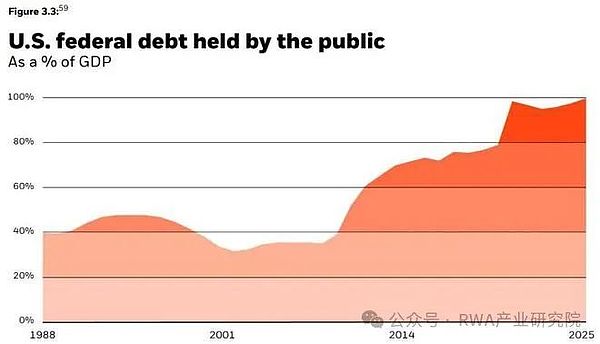
Author: RWA Industry Research Institute
Larry Fink, CEO of BlackRock, formally admitted in his 2025 annual letter to shareholders that Bitcoin can challenge the US dollar's global reserve currency status. He warned that an uncontrolled U.S. deficit could pave the way for Bitcoin to become a global reserve currency.
The letter clearly states that if the United States cannot control its debt and deficit, Bitcoin is both a disruptive innovation and a geopolitical risk. The letter reads: "If the United States cannot control its debts, if the deficit continues to expand, the United States may hand over this position to digital assets such as Bitcoin."
(Source: BlackRock)
This remark marks the head of the asset management giant that manages the world's $10 trillion admitted that digital assets can replace the US dollar in the global market.
Finck mentioned Bitcoin seven times and US dollars eight times in the letter. The importance of such similar frequencies in Fink's annual letter cannot be overstated.
On January 11, 2024, the US Securities and Exchange Commission approved BlackRock Bitcoin Spot ETF (IBIT), opening the door to digital assets for traditional Wall Street investors. Then when US President Trump turns to support Bitcoin, American giants' support for cryptocurrencies is gradually growing.
BlackRock's letter outlines a divergent view that although decentralized finance (DeFi) is known as "an extraordinary innovation", the company warns that its growth could undermine U.S. financial dominance.
The report emphasizes that if investors start to view Bitcoin as a more stable long-term value storage means than the US dollar, risks arise, especially in the case of persistent U.S. federal deficit and sovereign debt levels.
This framework positions Bitcoin as a macro hedging tool that is not just a speculative asset or store of value, but also a macro hedging tool against the instability of the United States. Its implications are similar to similar arguments raised by institutional investors in recent years, viewing digital assets as insurance for currency depreciation or geopolitical turmoil.
BlackRock's internal positioning of Bitcoin is not a pure theory. The letter disclosed that its Bitcoin spot ETF launched in the United States has become the largest product in the history of the ETF industry, and its assets managed in the first year exceeded US$50 billion. Its net asset inflows also ranks third among all ETF categories, second only to the S&P 500 Index Fund.
Retail adoption is the main driving factor, with more than 50% of the company's demand for Bitcoin ETP comes from individual investors.
It is worth noting that 3/4 of the participants have never owned BlackRock iShares before, indicating that Bitcoin is becoming an onboarding mechanism to attract new investor groups.
The company has also expanded its ETP products to Canada and Europe, marking the cross-border growth of institutional-level Bitcoin investment vehicles.
In addition to Bitcoin, Fink's letter also makes a broader argument that tokenization can change capital markets in a way that is comparable to the transition from postal to email. Fink compares tokenized asset infrastructure with the SWIFT network, believing that tokenized asset infrastructure can achieve instant peer-to-peer asset flows, thereby bypassing traditional financial intermediaries.
BlackRock believes that tokenization is a fundamental change in asset ownership, mainly through decentralization, improving voting systems and increasing the use of high-yield investment tools. The letter stated that these developments could reduce operational and legal barriers that historically restrict retail investors from participating in certain asset classes, thereby democratizing the capital market.
The company also emphasized the need to update the digital identity system and used the Indian model as a benchmark. It is believed that over 90% of Indians can safely verify smartphone transactions, making the country a leader in the digital infrastructure area necessary for a tokenized economy.
Inclusion of Bitcoin in a potential alternative to the US dollar reflects a significant shift in institutional perceptions. Although mainstream recognition of Bitcoin as "digital gold" has been increasing in recent years, BlackRock's wording points to a deeper economic argument——Macroeconomic Failure may accelerate the shift to a decentralized monetary system.
By citing tokenization and Bitcoin in the same strategic prospect, the letter proposes a framework in which digital assets are possible systemic alternatives to fiat currencies.
For the makers, this information is obscure, but it is very clear: the United States must modernize its financial system and manage its debt trajectory to maintain its monetary leadership.











